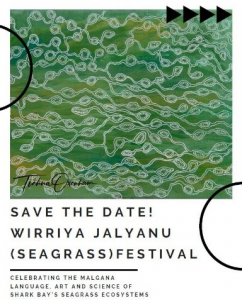Shark Bay (Gathaagudu) Seagrass Festival
Wirriya jalyanu (seagrass) festival
Science meets Art to celebrate seagrass and the local environment with Malgana language and cultural heritage
The Wirriya Jalyanu (seagrass) Festival is the culmination of a two year collaboration between seagrass researchers at the University of Western Australia and the Malgana Rangers as Traditional Owners of Gathaagudu (two waters, Shark Bay). The festival provides an opportunity to share knowledge about seagrasses and the environment with the local community.

